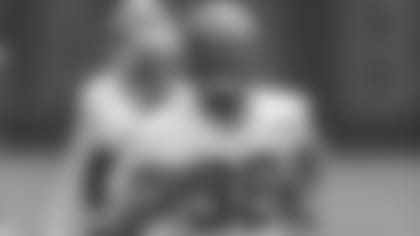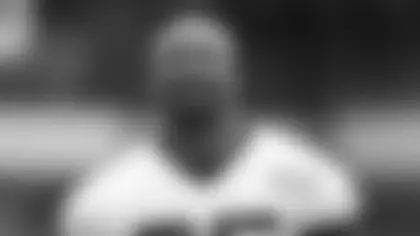For Cleveland Browns quarterback Brian Hoyer, perhaps the hardest thing about rehabbing the torn anterior cruciate ligament (ACL) in his right knee has nothing to do with physical pain, but rather, everything to do with patience.
Not one to sit around when work has to be done, Hoyer pushes himself daily, and that is why he finds himself actually ahead of schedule in the rehabilitation process.
"There's a lot of mental toughness that goes into it," Hoyer said. "There's definitely days that I've come in here and told (assistant athletic trainer) Gordon (Williams), 'I just don't feel like doing any of this today. We've been doing this non-stop.' It's like Groundhog Day, but he's always giving me encouragement like, 'You're getting better. You need to keep going.'
"It's tough because when you're doing the same thing over and over again, I'm wishing I was out there throwing routes or playing football. It does make you a stronger person because whatever doesn't kill you makes you stronger. I really believe in that saying because this is something that I plan on coming back stronger from. Every day, I come in with that mindset."
For Hoyer, the hardest part of taking the rehabilitation process day-by-day is knowing when to push through something and when to back off.
"I remember coming in every day and doing the range of motion, where you're literally sitting flat on the table and you're pulling your knee back," Hoyer said. "If I didn't get a degree further, I would be upset. (Williams) said, 'Look, you're so far ahead of where most people are, it's going to come.'
"Every day, I would literally push myself to the point of excruciating pain just to get the range of motion because I feel when you see the progress, it's something easier to look at. If I did 95 degrees two days in a row, I wanted 100, and then, from 100 to 105. Having those goals and then, meeting them, it's very rewarding."
Hoyer has also found a reward in supporting his teammates that, like him, are rehabbing injuries with the Browns' medical staff. He has paid special attention to running back Dion Lewis, as well as wide receivers Travis Benjamin and Charles Johnson, who like Hoyer, are working their ways back from torn ACLs.
Lewis, who broke a leg in a preseason game, and Hoyer have worked with Williams since the start of their rehabilitation processes.
"I'm not just in here alone doing it," Hoyer said. "There's six other guys that are in here, rehabbing. You'll see Charles Johnson rehabbing. We kind of become a close-knit group, me, Chris Faulk, Charles, Travis, Dion Lewis, Quentin Groves, Spencer Lanning. There's five other guys going through the same thing.
"Dion Lewis and I get after each other. We're constantly grinding together. I'm getting to see him progress. He's getting to see me progress. We're challenging each other, and I think that's crucial in coming back from something like this. When you're just doing it by yourself, you kind of lose sight (that) someone else is going through the same struggle."
By working out with several of his teammates, Hoyer has been able to build his reputation as a leader in the locker room.
"That just comes with being a quarterback," Hoyer said. "You need to be a leader and hold other people accountable. I think we hold each other accountable in here. We're constantly checking on the progress. You're seeing guys who are progressing just like you are. It makes you push yourself a little bit harder. We have bench marks with each other. Dion Lewis can be a great player, and I look forward to playing with him again, so I try to push him and he pushes me."
Hoyer plans on putting that leadership back to good use on the football field sooner rather than later.
"I'm sure I'll treat that first practice back like it was the Super Bowl, especially for how things got taken from me," Hoyer said. "I plan to pick things up right where I left off. I'm not going to care if it's a minicamp in April. When something like this happens to you, you realize you're one play away from maybe never playing again.
"I've always tried to look at it that way, but now that I've gone through something like this, I'll treat every play, whether it's a play in practice or a route in one-on-ones, I'll treat it like my last. I think that's something that can be useful. I'll be excited, and I'll make sure I get those guys fired up, just like I'm going to be."














